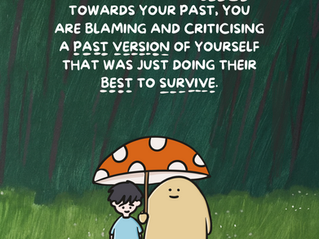WORKSHEET: Learning to express emotions.
- Hernping

- Jan 18, 2023
- 3 min read
A five-question reflection journal entry.

Why do we find it difficult to express our emotions?
Expressing our emotions is a highly subtle and complex thing. It’s a fine balance that we need to walk – deciding when to express them, or when to keep them in. For example, anger is an emotion that a lot of us have learned that we need to keep under control, rather than express it in its raw form.
Emotions, unprocessed, can come out unhealthily, and we depend on a process called Emotional Regulation in order to do so. Part of emotional regulation is our ability to repress emotions too. This is called Emotional repression or suppression – that is, learning to keep our emotions internal.
Healthy emotional repression helps us cope with a broad range of events we face, e.g. not shouting when angry, not crying when in a public or unsafe environment. However, too much repression has damaging consequences on our mental and physical wellbeing too (Patel & Patel, 2019).
How much is too much emotional repression?
One sign to look out for is your experience of the feelings themselves. As you probably know, the experience of “bottling up” our emotions isn’t a healthy thing to do.
Some signs of this happening is when the feeling lingers and doesn’t go away. Otherwise, it intensifies, causing us to ruminate and engage in behaviours that we would not choose to do. E.g. substance abuse, isolation, avoidance).
Emotions, after all, are there for a reason. They signal to us vital information about ourselves, in relation to the people or environment around us. And a lot of the time, it signals to us that a change is needed too.
What are some reasons why we feel difficulty in expressing our emotions?
1) We don’t know exactly how we feel.
Emotions are typically activated by subliminal stimuli and take place outside of conscious thinking. As a result, emotions often feel automatic, and can subconsciously influence our behavior without us being aware of them. Clarifying your feelings helps you connect with yourself, the values you have, and those you wish to live by. Similarly, stating your specific feelings increases the likelihood of being understood by others.”
2) We may have subconsciously learned that emotions are a “bad thing”
Some of us grew up in what’s known as an invalidating environment. The expression of our emotions to our key support figures, such as our parents, led to us being told to “stop feeling this way”. We might even have been dismissed, judged or even punished for feeling the way that we feel. Yet, this was also meant to be the point in our upbringing where we learned what healthy emotional regulation is. Unfortunately, in an invalidating environment, our young minds learned that to express emotions is also to invite danger, so we learned to repress them all instead.
3) We believe that expressing emotions doesn’t change anything.
In the same vein, growing up with support figures or caretakers who do not respond to our emotions or calls for needs to be fulfilled makes feeling and expressing emotions seem futile too. Even when we were brave enough to express it, it often felt like nothing changed – whatever needs that we needed to be fulfilled – such as a love, safety, connection, support – went on being unfulfilled.
4) We may not be sure which feelings to trust.
Some of our feelings are influenced by our own knee-jerk conclusions or expectations regarding an event. So, yes, it may help to take a moment to pause before sharing all of your feelings.”
However, here’s the thing. It is not your fault that you find yourself at stage – where feeling your emotions and whether to express (and how to as well) feels like a difficult thing.
Because of your past, this was not something you may have given the opportunity to experience and healthily learn. In fact, emotional regulation is something children don’t innately know how to do, and not meant to figure out all on their own.
We were meant to be shown and guided through this process – not with punishment, invalidation, inaction, or disdain – but with calmness, love and care instead.
And it is this missing experience is what we need to do for ourselves in order to heal.
The practice:
In the worksheet below is a printable journal entry – you can print a few pages to note down the times when you found it difficult to express your emotions. These are times when you wanted to say something about how you feel, but you couldn’t.
As you will see in this practice, we will also note down why expressing emotions is important for us, what the consequences of keeping them are, and learning what’s getting in the way of them too.
.jpg)

























Comments